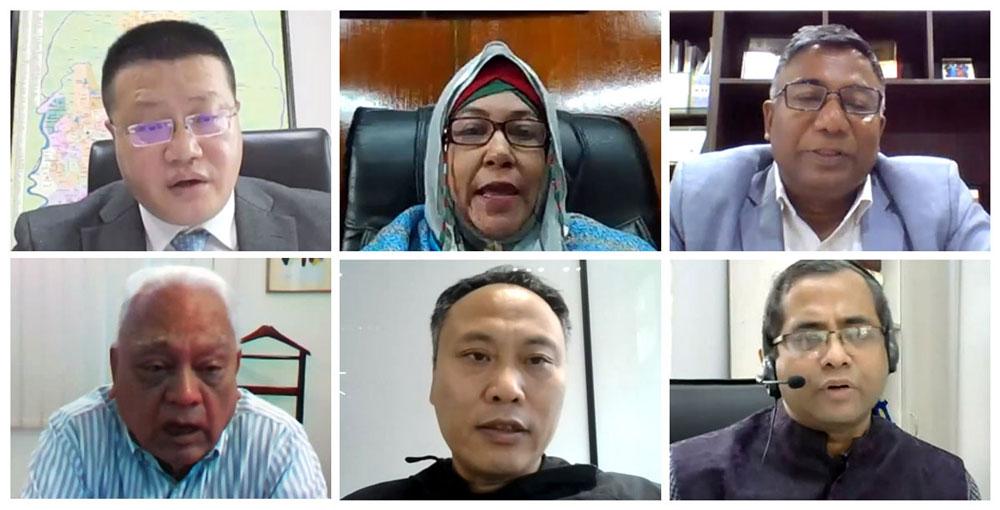
China has become one of the frontrunners in renewable energy-based economy in the world. It remains the world’s largest producer of renewable energy. In 2021, China’s renewable energy accounted for 29.4 per cent of total power generation, marking a significant increase from 7 per cent a decade earlier. Since Bangladesh aims to achieve 40 per cent renewable energy by 2041, China’s investment and development experience in the renewable energy sector can help Bangladesh achieve this goal.
In this context, the Centre for Policy Dialogue (CPD) conducted a study on ‘Opportunities and Challenges for Overseas Investment in the Renewable Energy Sector of Bangladesh: The Case of China’ to analyse how China became the global leader in the renewable energy sector from being one of the biggest fossil fuel consumers by strengthening its institutional, legal, financial, technical, and operational aspects of the renewable energy sector. This analysis can help to find a way forward for Bangladesh to transition to renewable energy sources.
Based on this study, a kick-off virtual dialogue was organised on Monday, 23 October 2023. The dialogue was divided into two sessions. The first session focused on China’s achievements in renewable energy development, while the second session addressed opportunities and challenges for overseas investment in Bangladesh’s renewable energy sector.
H E Mr Yao Wen, Ambassador, Extraordinary and Plenipotentiary People’s Republic of China to the People’s Republic of Bangladesh, attended the dialogue and acknowledged ‘Bangladesh possesses abundant renewable energy resources, including solar, wind, and tidal energy’. He said that projects like the solar power plant in Sonagazi and the wind power plant in Cox’s Bazar are indicative of the country’s commitment to harnessing these resources for sustainable and clean energy production.
While discussing about Foreign Direct Investment (FDI), Ms Waseqa Ayesha Khan, MP, Chairman, Parliamentary Standing Committee on Ministry of Power, Energy and Mineral Resources (MoPEMR), highlighted ‘Bangladesh is not just seeking FDI; it is also eager for technology transfer’. She also said that the country has designated special economic zones to facilitate foreign investors, and the emphasis is on attracting investments in manufacturing plants to foster economic growth and technology exchange.
The dialogue was chaired by Syed Manzur Elahi, Chairman, Apex Group; Former Member (Minister) Advisory Council of the Caretaker Government and Member of CPD Board of Trustees. He underscored ‘In today’s business world, buyers increasingly prefer to engage with sustainable businesses, as sustainability has become a compliance requirement. Therefore, it’s time for Bangladesh to begin transitioning to renewable energy to retain its customers’.
Dr Khondaker Golam Moazzem, Research Director, CPD, moderated the session and addressed the importance of establishing a communication platform between the two countries to exchange experiences, tackle challenges, and encourage renewable energy investment.
In his keynote presentation of the first session, Mr Mashfiq Ahasan Hridoy, Research Associate, CPD, highlighted ‘China’s success in renewable energy development can be attributed to its rigorous legal system, institutional capacities, state-of-the-art technologies, and effective policies and programs.’ He pointed out that China’s prolonged success in the renewable energy industry is attributed to its strong legal framework.
Reflecting on this, he recommended that Bangladesh should develop a legal framework that supports renewable energy development by approving the Renewable Energy Policy (Draft) 2022. Institutions like Sustainable and Renewable Energy Development Authority (SREDA) should take more actions for developing and implementing the legal and administrative supports for the renewable energy development in the country. The SREDA, in collaboration with the Department of Land, Ministry of Environment, Forest, and Climate Change (MoEFCC), and Ministry of Finance (MoF), should enhance its capacity and formulate plans to ensure there are no conflicts with any relevant government entities.
In the second session, he underscored his recommendations for increasing foreign financing and said ‘To attract investment from the Multinational Corporations (MNCs), Project Profiles (PPs) should be made according to the global standards.’ He urged that an investment promotion agency other than the Board of Investment should be established. In this regard, Bangladesh Investment Development Authority (BIDA) can promote renewable energy investment to attract foreign investments and loans.
‘The Government’s investment can be increased to achieve trust of foreign investors’, stressed the Research Associate. He clarified that unless the government has their own initiatives to attract local investments, foreign entities will always be doubtful before financing in the country.
‘The availability of land is a critical factor influencing renewable energy projects in Bangladesh’ said Mr Mohammad Hossain, Director General Power Cell, Power Division, Government of Bangladesh. He informed that the Government is actively considering offshore wind energy as a viable option to address this challenge.
Mr Wang Weiquan, Deputy Secretary General, Chinese Renewable Energy Industries Association (CREIA), said ‘China’s renewable energy has a long history of 40 years. Through the Rural Energy Taskforce, which was a small team, it was developed into a whole division which is now National Energy Agency.’
‘China in the past 20-30 years made progress in the renewable energy sector and some of those experiences can be applied to Bangladesh’ said Mr Qin Haiyan, Secretary General, China Wind Energy Association. He explained that China’s success in renewable energy can be attributed to their ability to produce a relatively inexpensive form of energy using the most cost-effective energy sources available.
Mr Peng Gan, Managing Director Chint Solar (Bangladesh) Co. Ltd opined ‘Many companies in Bangladesh have seen a strong presence of Chinese team members, but they often do not stay in Bangladesh for an extended period. It is crucial to have a permanent presence in Bangladesh to better understand and navigate the nuances of the Bangladeshi market.’
Mr Rong Hai, Chief Representative, Southwest Electric Power Design Institute Co., Ltd Bangladesh said ‘Photo Voltaic (PV) projects in Bangladesh are experiencing significant growth. However, the challenge of land acquisition in the country demands substantial capital investment and time. This often leads to project delays and increased expenditures’.
The virtual dialogue was attended by 96 participants, many of whom took part in the discussion and shared their valuable insights.

